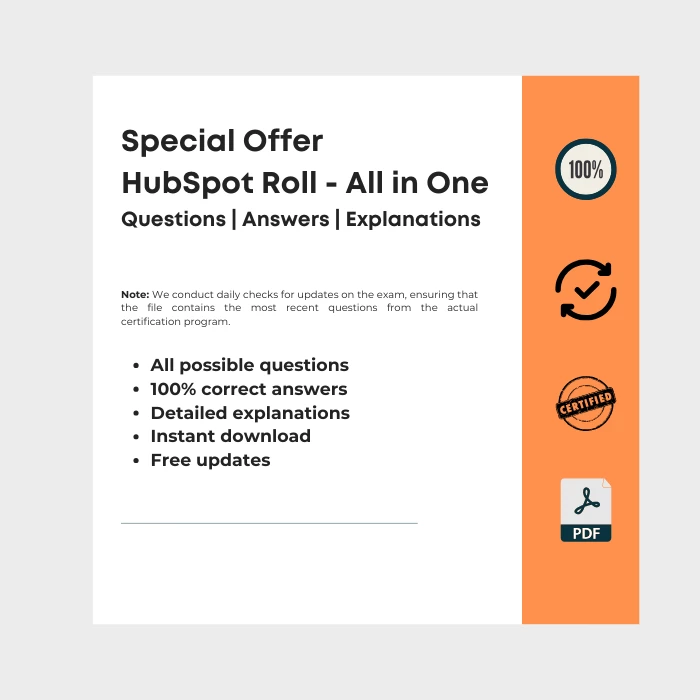Select all that apply. What are some of the new ways that marketers will need to adapt in a future without third-party cookies?
Focus on first-party and second-party cookie data
Increase the usage of third-party cookies
Use AI and machine learning
Use non-digital forms of advertising

HubSpot Roll. Includes Answers for Every Real HubSpot Certification Exam.
All-in-One: Get all HubSpot exams answers with explanations in one bundle. This package includes answers for every current HubSpot certification. Regular updates to reflect the latest exam version. -> See what's included.


Need a single cerification exam answers? Check out our -> list of certification exams answer keys. Learn Smarter. Obtain or Renew your certificates with peace of mind!
Explanation: Select all that apply. What are some of the new ways that marketers will need to adapt in a future without third-party cookies?
Explanation: The correct answers are **Focus on first-party and second-party cookie data** and **Use AI and machine learning**. In a future without third-party cookies, marketers will need to adapt their strategies to rely more heavily on first-party and second-party cookie data for audience targeting, personalization, and measurement purposes. First-party cookies, collected directly from user interactions with a brand's website or app, provide valuable insights into user behavior and preferences within the brand's ecosystem. Similarly, second-party cookies, obtained through partnerships with trusted sources, offer additional data from complementary or affiliated platforms, enabling marketers to expand their audience reach and enhance targeting capabilities. Additionally, leveraging AI and machine learning technologies becomes increasingly important for analyzing and interpreting vast amounts of data collected from first-party and second-party sources, extracting actionable insights, and optimizing advertising campaigns in real-time. By harnessing advanced analytics and predictive modeling techniques, marketers can effectively navigate the complexities of a cookieless digital landscape, deliver more personalized and relevant experiences to consumers, and achieve their marketing objectives. Conversely, increasing the usage of third-party cookies is not a viable adaptation strategy in a future without such tracking mechanisms, as regulatory and technological shifts are leading to their decline. Similarly, while non-digital forms of advertising may complement digital strategies, they do not directly address the challenges posed by the absence of third-party cookies in online advertising ecosystems. Therefore, focusing on first-party and second-party cookie data and leveraging AI and machine learning technologies are essential strategies for marketers to thrive in a cookieless future, driving effective targeting, engagement, and performance across digital channels.

Special Bundle Offer HubSpot Roll. All in One
Note: We conduct daily checks for updates on the exam, ensuring that the file contains the most recent questions from the actual certification program.
Questions | Answers | Explanations. FREE Updates.
You may also be interested:
- Special HubSpot bundle offer - all HubSpot exams in one
- HubSpot CMS for develpers certification exam answers
- HubSpot CMS for develpers II certification exam answers
- HubSpot content hub for marketers certification exam answers
- HubSpot content marketing certification exam answers
- HubSpot contextual marketing certification exam answers
- HubSpot digital advertising certification exam answers
- HubSpot digital marketing certification exam answers
- HubSpot email marketing certification exam answers
- HubSpot frictionless sales certification exam answers
- HubSpot growth driven design certification exam answers
- HubSpot inbound certification exam answers
- HubSpot inbound marketing certification exam answers
- HubSpot inbound marketing optimization certification exam answers
- HubSpot inbound sales certification exam answers
- HubSpot integrating with HubSpot I foundations certification exam answers
- HubSpot marketing hub software certification exam answers
- HubSpot reporting certification exam answers
- HubSpot revenue operations certification exam answers
- HubSpot sales enablement certification exam answers
- HubSpot sales hub software certification exam answers
- HubSpot sales management certification exam answers
- HubSpot sales software certification exam answers
- HubSpot seo certification exam answers
- HubSpot seo II certification exam answers
- HubSpot service hub software certification exam answers
- HubSpot social media marketing certification exam answers
- HubSpot social media marketing II certification exam answers